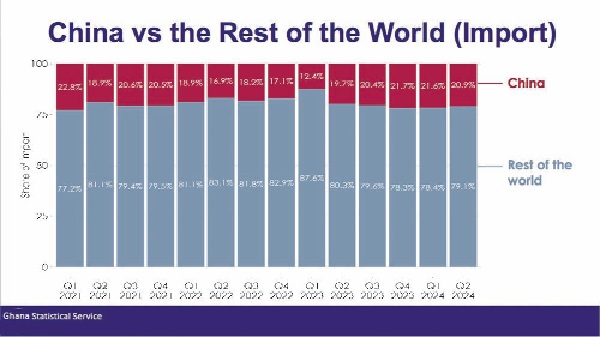
Petroleum products dominate imports in Q2 — Gold leads exports
Ghana’s import market continues to be dominated by refined petroleum products, with gas oil and motor spirit super accounting for a quarter of the total import bill in the second quarter of the year.
Out of the country’s total import bill of GH¢58.8, gas oil accounted for GH¢7.3 billion, with motor spirit super accounting for GH¢7.2 billion.
Presenting the international trade statistics for the second quarter of 2024, Government Statistician, Professor Samuel Kobina Annim, said the country’s total trade value was GH¢123.0 billion, with exports totaling GH¢64.2 billion and imports totaling GH¢58.8 billion.
This led to a trade surplus of GH₵5.4 billion, marking a reversal from a deficit of GH¢3.1 billion recorded in the same period in 2023.
Trade partners
He said the data indicated that Asia remains Ghana’s leading trade partner, contributing over half of the country’s imports and nearly half of its exports in the period under review.
“Between the second quarter of 2023 and second quarter of 2024, the share of imports from Europe declined by 7.5 per cent, while imports from Asia increased substantially by 8.5 per cent,” he said.
He said Gold bullion led Ghana’s exports with a value of GH¢37.0 billion, accounting for 57.6 per cent of total exports.
Other major exports included crude petroleum (GH¢12.6 billion) and cashew nuts (GH₵1.2 billion).
Top export destination
The United Arab Emirates (UAE) remained Ghana's top export destination, accounting for GH¢15.0 billion, representing 23.3 per cent of total exports.
Switzerland followed closely with exports valued at GH¢13.2 billion representing 20.5 per cent, while South Africa ranked third, with exports amounting to GH₵8.3 billion (12.9%).
China remained the primary source of Ghana’s imports, contributing GH¢12.3 billion (20.9% of total imports), followed by the UAE with a value of GH¢9.1 billion (15.4%) and the United Kingdom with an import value of GH¢5.2 billion (8.8%).
Prof Annim said the Export and Import Unit Value Indices (UVIs) revealed price shifts in key commodities, adding that export prices recorded a 40.5 per cent year-on-year increase, driven largely by surging gold prices while import prices increased by 18.9 per cent.
"In the computation of nominal and real trade values, we have denominated it in cedis. The more than doubling of the nominal values were from GH¢46.3 billion around the second quarter of 2021 to the current figure of GH¢123 billion, so we have adjusted for price changes from a cedi-denominated perspective,” he said.